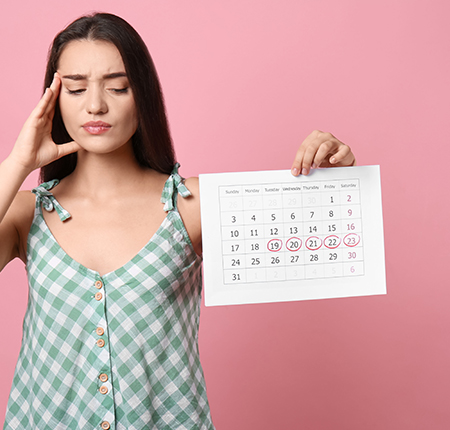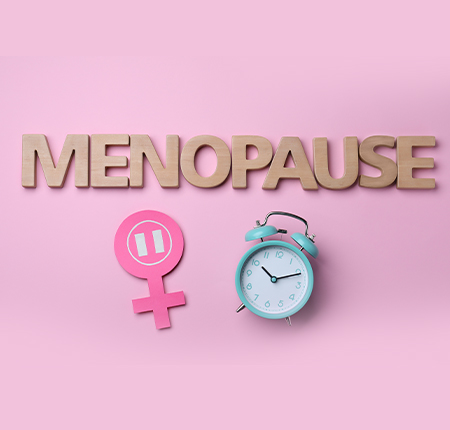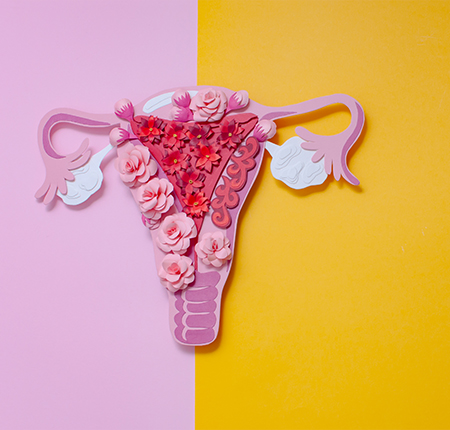
Short menstrual cycle - Why does menstruation stop after one day?
There is a fine line between normality and abnormality of the menstrual cycle. Indeed, on the one hand, every woman's body is unique, and it is normal for the duration, flow and symptoms of each cycle to differ from person to person. But on the other hand, there are certain durations or extreme symptoms that are not normal regardless of the circumstances, such as too strong menstrual pain, too long a cycle or, on the opposite pole, too short a menstrual cycle.
And yet to detect these anomalies, the first step is to know what a normal duration means, and when it can be considered too short a period. We talk about all this information and other useful things in this article.
How long is a normal menstrual cycle?
Theoretically, we know that the menstrual cycle has an average of 28 days, but this duration can vary without any abnormality. Let us tell you why. The menstrual cycle has 4 phases, namely:
The follicular (pre-ovulatory) phase, which is the period before ovulation and lasts about 9-14 days.
Ovulation, which lasts only 24 hours and is the time of the month when your fertility is at its peak.
The luteal phase (post-ovulatory or pre-menstrual), i.e. the period when you experience premenstrual symptoms and which, again, lasts approx. 14 days, respectively until the first day of menstruation.
Menstruation, meaning actual bleeding when the uterine lining is shed, which can last between 3 and 7 days; the first day of menstruation is considered day 1 of the menstrual cycle.
If we add the duration of all these 4 phases of the normal cycle that differ for each woman, we arrive at a result between 21 and 35 days, which represents the duration of a normal menstrual cycle. As for the duration of a normal period, bleeding can last anywhere from 3 to 7 days, but most of the time it reaches somewhere between 4-5 days.

What is considered abnormal is that the interval between two periods exceeds 35 days, that the period lasts less than 2 days or more than 7 days, or that it is very different for the same person from one month to the next. In this case, we are talking about irregular or deregulated cycle, and a visit to the specialist doctor is needed.
Symptoms of a short period
So let's get back to our topic: what does a short period mean and how long does it last?
If you have always had irregular or short periods of 2-3 days, there is most likely no cause for concern. But if the monthly bleeding lasted between 4-7 days and suddenly reduced to 2 days or less, then we are talking about a short period that you need to pay attention to.

Here are the symptoms by which you can recognize it and which you should watch out for:
Short cycle of 2 days or less: This is the most obvious and easy to see sign that you have a period that is too short, meaning it only lasts for one or two days and then stops.
Light flow: The blood may flow normally or heavily during this period, but it is equally possible to be light, more like spotting than menstruation, especially if the shortness of time is a result of hormonal disturbances, too intense training or loss sudden weight gain.
The need to change fewer pads and tampons than usual: because the flow is reduced.
Cycle twice a month: When your menstrual cycle lasts 21 days or less, you may get your period twice in the same month, once at the beginning and once towards the end. This phenomenon is called polymenorrhoea and represents a form of irregular menstrual cycle, a subject about which I told much more on the blog, HERE .
Anemia and fatigue: Anemia, fatigue, and exhaustion can also occur with polymenorrhea because you bleed more frequently than your body is used to.
Menstrual Cramps: Short periods can also be accompanied by severe abdominal pain.
Causes - Why does menstruation stop after a day or two?
There are several possible causes for a short and scanty period. But we want to remind you and pay attention to the signs, so you don't confuse short periods with spotting.
If the bleeding is very light, light in color, and just stains your underwear a little without needing an absorbent pad or tampon to absorb it properly, then we are not talking about a 1-day cycle, just spotting.
It is considered menstruation when for bleeding, whether it is light or heavy, it is not enough to use a protective panty to prevent leakage on clothes.
So watch this aspect to make sure you don't confuse them. And either spotting or menstruation, we recommend that you use only 100% organic cotton menstrual products . You can find them on our website and they are a healthy choice for your body, because unlike conventional products they contain only natural ingredients and are made without plastic, pesticides, perfumes, dioxins and other toxic chemicals.

And once you have established that it is short menstruation, look below at the factors that can cause it:
Task
Have you heard of implantation bleeding? It can last one or two days and that's why you might be tempted to say "I only had my period for 2 days". In fact, it is not a period, but only a sign that the fertilized egg has reached the uterine lining.
It is light bleeding that can vary in color from light pink to dark brown, and can occur around 2 weeks after conception. We say it can happen because, although it is normal and does not endanger the fetus, not all pregnant women have this bleeding. It is also normal to experience some light bleeding during the first trimester as more blood vessels develop in the vaginal area. 
It is also good to know that vaginal bleeding accompanied by dizziness, fatigue, the feeling of pressure in the rectum and strong abdominal pain, more intense on one side, is a first sign of ectopic pregnancy. In this case, an urgent visit to the doctor is recommended.
Pregnancy loss
If the light bleeding in early pregnancy that we talked about above turns into a heavy flow, or is even accompanied by abdominal pain, painful contractions, clots and unusual discharge, this can indicate a problem that can often be the loss the pregnancy.
This situation is quite common, and statistics indicate that such bleeding happens in approx. 26% of tasks.
breast-feeding
Normally, after giving birth, if you are not breastfeeding, your period usually returns within 6 to 8 weeks. Otherwise, it can take 6 months and even up to 18 months for monthly bleeding to return to normal, and this is due to hormonal fluctuations.
Throughout breastfeeding, estrogen and progesterone continue to fluctuate while prolactin, another hormone that contributes to the production of breast milk, also has an impact on menstruation, in the sense that it prevents it. So, breastfeeding is another factor that can cause your period to be irregular, and it can also cause your period to be delayed, your flow less, or your period shorter.
Anovulatory cycle
If it happens that your body does not release an egg, this may be the reason why the flow and duration of the period is less than usual. In the absence of the ovulation phase, we call this an anovulatory cycle, and it is one of the factors that can disrupt your periods.
There is also a condition called primary ovarian failure, when your ovaries stop working properly and stop releasing eggs even if you have not yet reached menopause.
Cycle irregularities before menopause
Estrogen production declines in the run-up to menopause, and it's normal for hormonal fluctuations to disrupt your menstrual cycle as well. Perimenopause starts approximately 8-10 years before menopause, so you can notice the first signs from the age of 30-40.

As estrogen levels decline during the transition to menopause, periods become irregular, longer or shorter, with lighter or heavier flow. Including very short periods of only a few days are normal and accompanied by other symptoms of perimenopause such as night sweats, vaginal dryness and insomnia.
Polycystic ovary syndrome (PCOS)
Another cause of ovarian problems that can shorten your menstrual cycle and affects approx. 1 in 10 women, polycystic ovary syndrome refers to a hormonal imbalance that prevents the ovaries from working properly and releasing eggs each month. 
In addition to menstrual irregularities, PCOS also manifests itself in acne, thinning or excessive hair growth. The same condition can also cause benign ovarian cysts and infertility.
ENDOMETRIOSIS
In addition to the very painful menstrual cramps that you probably already know endometriosis is known for, the same condition can also be responsible for irregular and shortened menstrual cycles.
In short: when the endometrium, tissue similar to the lining of the uterus, develops outside the uterus (for example on the ovaries, around the uterus or even in the vagina), we call this endometriosis. The problem affects many women between the ages of 15 and 44 and can include bloating, nausea, pain during or after intercourse, and chronic pelvic and back pain. 
During menstruation, this endometrium thickens and bleeds just like the tissue inside the uterus, which can cause irregular, heavy, and unpredictable bleeding.
pill
Just as at the beginning of pregnancy you can experience implantation bleeding, in the same way at the beginning of the administration of contraceptives you may notice a bleeding which in English is called "breakthrough bleeding" and which is not a cause for concern. It is a small, unexpected loss of blood that can occur at any time during the month, not just during menstruation.
Symptoms can occur with any form of pregnancy prevention, but especially with contraceptives, contraceptive implant or intrauterine device. If the bleeding does not last long and is not accompanied by pain or other forms of discomfort, you do not need to worry. It's just your body getting used to the treatment and establishing a new hormonal balance.
Intermenstrual bleeding
um also gives it its name, it is the bleeding that occurs on days other than the menstrual period. It can be caused either by a hormonal imbalance or by the development of abnormal formations.
Researchers have studied this phenomenon to see if and to what extent it affects fertility.
Although studies suggest a link between breakthrough bleeding and infertility, this link only relates to the decreased likelihood of getting pregnant that month. But not in the long run. Specialists did not notice any impact of bleeding on fertility and women's ability to get pregnant in the future.
However, it is good to talk to your doctor if you notice such bleeding often, so that the cause can be identified and treated before further complications arise.
Other possible causes for a short period
The above causes are the major factors that influence the menstrual cycle and have a high potential to shorten your period. But a period that lasts only a few days can also be a result of other habits in your daily routine or health problems, including:
Hormonal disorders: such as thyroid problems;
Daily stress: which radically increases your cortisol level;
Anemia: due to low iron levels in the blood;
Extreme diets and excessive training: which automatically create a large caloric deficit and lead to sudden weight drops that can cause hormonal imbalances.
Ovulation: There are women who notice spotting or light bleeding in the middle of the menstrual cycle when the egg is released.
Uterine fibroids: Small, non-cancerous growths outside the uterus that can cause vaginal bleeding between periods.
Infections: Vaginal bleeding can also be a symptom of infections in the vagina and cervix, including pelvic inflammatory disease or sexually transmitted diseases.
Brutality of intercourse: Any injury caused during intercourse can destroy the vaginal mucosa and cause bleeding.
When should you contact a doctor?
Anytime you notice abnormal bleeding, it's a good idea to talk to your doctor to rule out any concerns or treat any potential problems. But how do you know when your bleeding or period is normal, and when it's too short? 
Given that every body is different, we recommend asking your question contextually. That is, you don't ask yourself "Is it normal how long my period lasted?" but "Is it normal for me how long my period lasted, if I relate to how it has been so far?" And it is necessary to contact a doctor as soon as possible if the answer to this question is no (that is, your period was different and abnormal compared to the previous months), and if:
The menses were regular up to the present time and suddenly became irregular;
You menstruate 2 times a month, i.e. a menstrual cycle shorter than 24 days;
Bleeding outside of your periods;
You notice large blood clots;
The bleeding is accompanied by abdominal cramps;
You have a heavy flow.
Does scanty menstruation require treatment?
Sometimes, such as during stressful or demanding times, breastfeeding, adolescence or perimenopause when it is natural for the menstrual cycle to be irregular, it is normal for periods to be shorter as well. In these cases, treatment may not be needed.
However, it is important and we always recommend that you visit your gynecologist and follow his advice.
If your periods are short or scanty as a result of any of the causes mentioned above, be it hormonal imbalance, infection, anemia, or another health problem, then it is important to treat the cause - and your menstrual cycle and length will regulate itself. .
Hi!
an ENROUSH account.
Let's create a new account for you!
You're almost there.
Choose the checkout method:
Shopping Cart
{{ line.unit_price }} {{ line.product.currency }} / unit per billing cycle
VAT included
-
Subtotal{{ formatPrice(cart.cart.total_price - cart.cart.total_discount_value) }} RON
VAT included


















